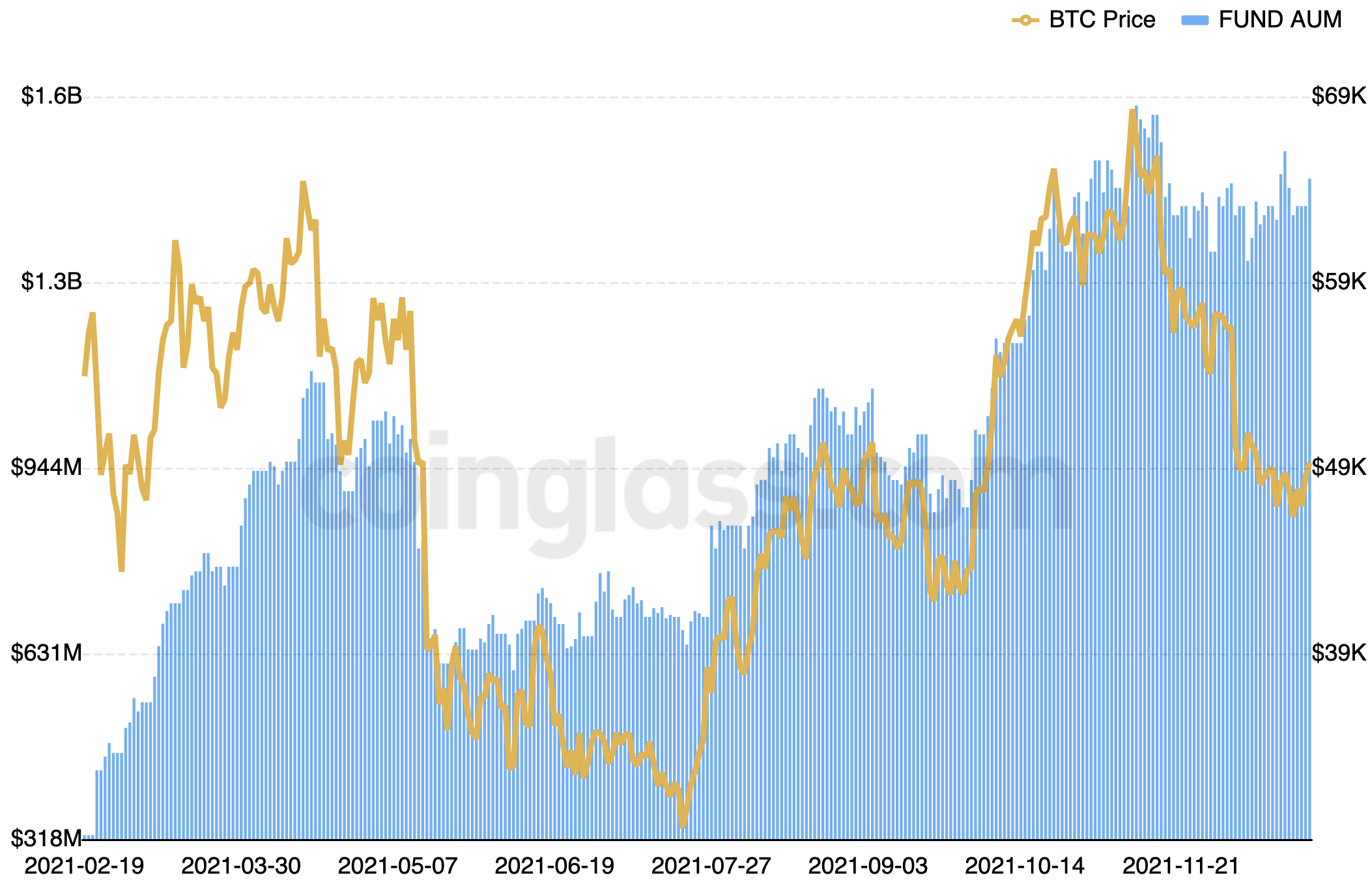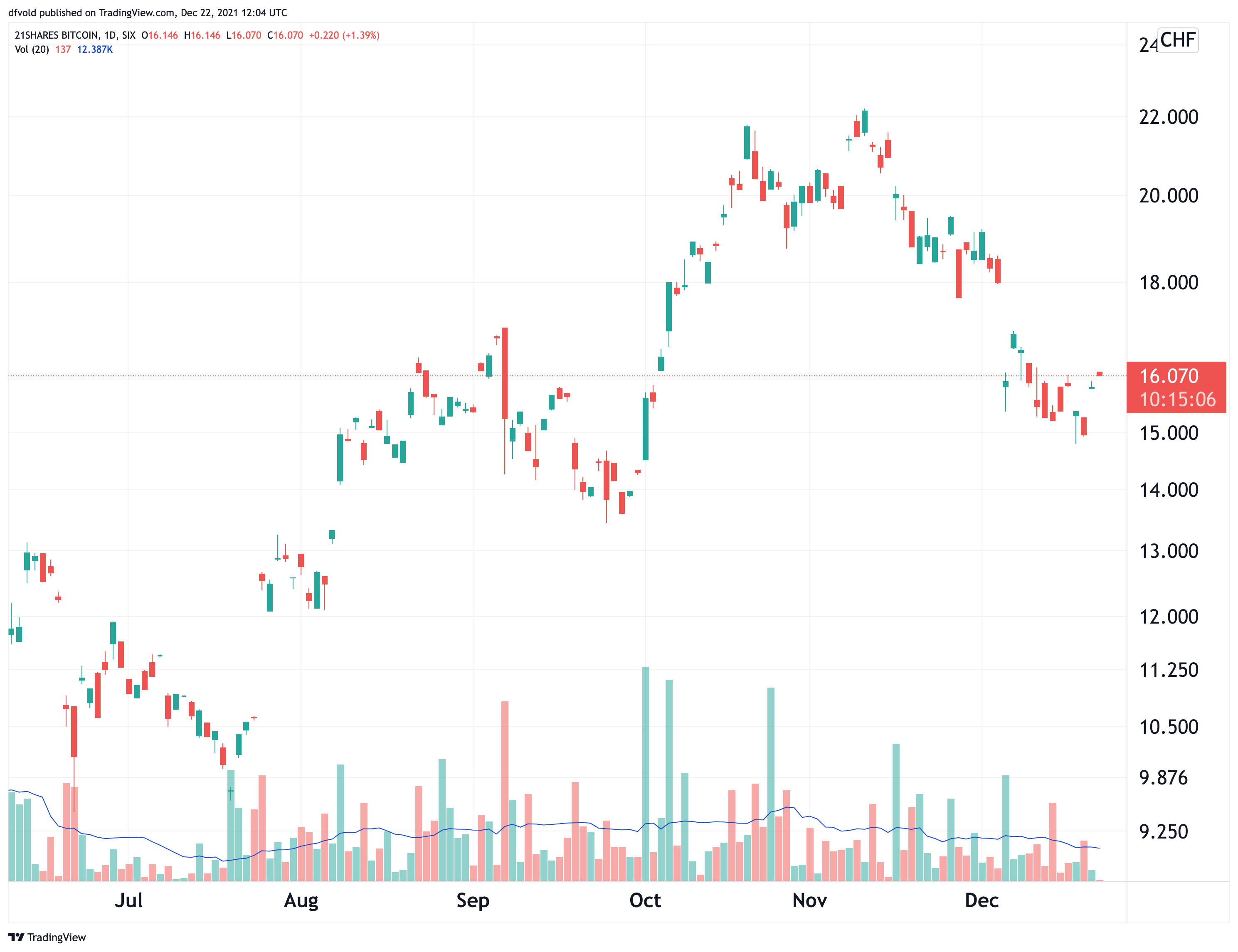Bitcoin ETFs in Europe & Canada Remain Popular Even With US ETFs Widely Available

Interest from investors in bitcoin (BTC)-backed exchange-traded funds (ETFs) and the closely related exchange-traded products (ETPs) listed in Canada and Switzerland has remained high, despite bitcoin futures-backed ETFs now being available in the US, trading data compiled by Cryptonews.com shows.
In the North American market, the first bitcoin ETF to launch was the Purpose Bitcoin ETF (BTCC), launched in Canada on February 18 this year. Since then, four other bitcoin ETFs have been listed in the country: Evolve Bitcoin ETF (EBIT), CI Galaxy Bitcoin ETF (BTCX), 3iQ CoinShares Bitcoin ETF (BTCQ), and Fidelity Advantage Bitcoin ETF.
Among these, Fidelity’s ETF was the last one to be listed, going live on December 2, after the company received pushback from US regulators on their plans to list there.
The Canadian bitcoin ETFs differ from the ones listed in the US in that they are all backed by ‘physical’ bitcoin, whereas the US-listed bitcoin ETFs are only backed by bitcoin futures contracts, which increases both complexity and costs of managing an ETF.
Since being listed as Canada’s first bitcoin ETF, BTCC has seen its assets under management (AUM) grow substantially, and even holding up relatively well during periods of lower bitcoin prices.
BTCC AUM compared with BTC price:

Worth noting is also that the demand for the ETF remained strong even as the first bitcoin futures ETF, BITO, launched in the US on October 19 this year. Instead of seeing a fall in the assets under management, capital continued to flow into the fund, indicating that physically backed ETFs are not at all threatened by the newer futures-backed ETFs.
Looking at trading volumes for the second Canadian bitcoin ETF, EBIT, it is also clear that interest has remained high, with higher trading volumes recorded in November compared to the days immediately following the launch in February.
On December 21, the 20-day moving average of ABTC’s trading volume stood at 12,840 shares, compared to a 20-day moving average of nearly 60,000 shares at the beginning of the year. As with Canada’s first bitcoin ETF, trading volumes in EBIT did not react negatively to the launch of the first bitcoin ETF in the US, with interest instead increasing even further in the days following the US listing on October 19.
Price and trading volume for EBIT:

In Europe, several physically-backed bitcoin ETFs are also listed, with Switzerland being known as a friendly jurisdiction for listing bitcoin ETFs for a number of years now. The country is now home to many bitcoin-focused ETFs and ETPs, issued by well-known companies like WisdomTree, 21Shares, CoinShares, and VanEck.
Among the various bitcoin investment vehicles listed in Switzerland, WisdomTree’s BTCW ETF has seen relatively stable trading volumes as of late. Like many of the Canadian ETFs, however, BTCW also saw a peak in its volume shortly following the listing of the first bitcoin futures ETF in the US.
For BTCW, October 20 marked a peak in interest among traders, with 633,572 shares changing hands that day, compared with just 38,326 as of Tuesday this week.
Lastly, 21Shares’ Switzerland-listed bitcoin ETF, ABTC, has seen slightly falling trading volumes during the second half of this year. The lower trading volumes stand in contrast to the much stronger interest that was seen for this ETF in late 2020 and early 2021, when the selection of bitcoin-backed investment products was more limited.
As of December 21, ABTC saw 3,976 shares changed hands, compared to a 20-day moving average of nearly 60,000 shares at the beginning of the year.
Unlike some other ETFs in Canada and Switzerland, ABTC did not experience any significant effect in terms of trading volume after BITO went live in the US.
Price and trading volume for ABTC:

Looking at how interest in these funds have changed after the first bitcoin futures-backed ETF, it is clear that the launch of the first bitcoin futures ETF in the US this fall was a major event for the market. This was true despite the fact that the first ETF, and all other bitcoin ETFs approved in the US since, have been backed by futures contracts, and not physical bitcoin, which is clearly preferred by investors.
Still, an easy way to get exposure to the price of bitcoin via US stock markets has undoubtedly boosted interest in the cryptocurrency as an investment, both in North America and Europe, as shown by the persistently strong interest in bitcoin-backed ETFs and ETPs in all of these markets.
____
Learn more:
– Grayscale Finds Rising Interest in Bitcoin as it Pushes for Spot BTC ETF
– Invesco Joins Bitwise in Blaming the SEC for Decision to Withdraw ETFs
– Slow Start for Third Bitcoin ETF, Lower Costs Could Attract More Capital
– This Is Why Bitwise Withdrew BTC Futures ETF
– Grayscale vs. SEC, Fidelity’s Bitcoin ETF, Investments in Metaverse, NFTs + More News
– El Salvador Buys Bitcoin Dip Again, WisdomTree Launches 3 Crypto ETPs + More News




